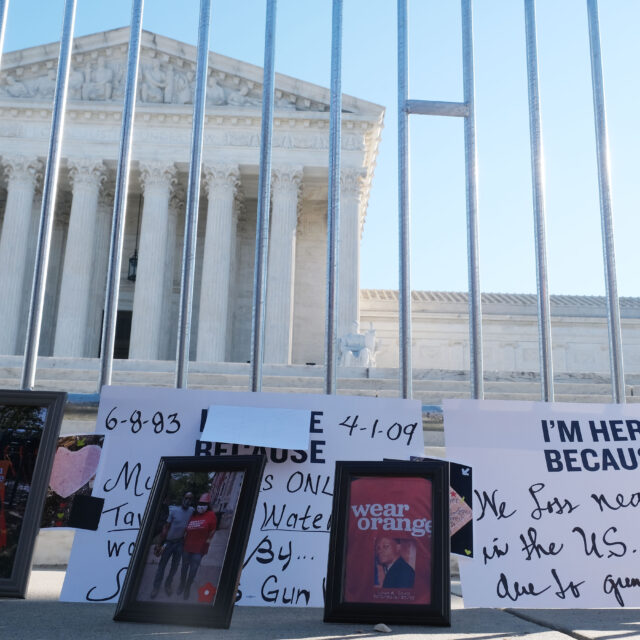When Sheriffs Refuse to Follow the Law

4.8.2019
The past year has seen dozens of states pass common-sense gun safety laws, from strengthening background checks in Washington state to Maryland’s requirement that those convicted of domestic violence surrender their firearms to New Mexico’s recent decision to close the unlicensed gun sale background check loophole. As citizens and as lawyers working to reduce gun violence in this country, we have cheered these legislative victories. They are part of an overwhelming trend towards evidence-based laws that lead to safer communities.
But we have watched with dismay in recent weeks as county sheriffs in some of these same states have publicly announced that they will not enforce these newly enacted laws. Their reason? They say that they believe these laws violate the Second Amendment of the U.S Constitution.
To be clear, the laws they oppose are precisely the types of laws that courts repeatedly have upheld against constitutional challenges, finding that they do not violate the Second Amendment. But the problem with these sheriffs’ actions is not just that they are wrong about whether these laws are constitutional. The real problem is that these sheriffs are overstepping their role in the constitutional system and, in the process, undermining the rule of law.
When a private person or an elected official disagrees with a law or public policy, the First Amendment protects their right to speak out against the law, to petition the government — by lobbying for new laws — and, if they have legal standing, to sue and challenge the law’s constitutionality. This is what the rule of law looks like: those who disagree with a policy or statute may use legitimate and constitutional processes to try to change it.
But what many of these sheriffs want to do is not legitimate and would be a step on the path towards lawlessness. Sheriffs are charged with enforcing the laws, not deciding for themselves whether they are constitutional. As one court has explained, “the oath to support and defend the Constitution requires a public official to act within the constraints of our constitutional system, not to disregard presumptively valid statutes and take action in violation of such statutes on the basis of the official’s own determination of what the Constitution means.”
These sheriffs seek to disregard the will of the voters of their states, circumvent the legislative process, and short-circuit the judicial function. They may say that they are “defending the constitution,” but the reality is that they are trampling on it. They may say they are exercising “prosecutorial discretion,” but in fact they are violating their oaths to uphold and enforce the laws of their state. Our constitutional democracy has no place for those who seek to become a one-man government.
These sheriffs are also mistaken in claiming that because a law has been challenged in court, that gives them license to ignore it until the legal case is decided. Unless a court issues an injunction, duly enacted laws must be enforced unless and until a court issues a decision striking them down. Otherwise the mere filing of a lawsuit could stop a law in its tracks. That is not the way our system of checks and balances and separation of powers works.
By setting a precedent that they — and other local officials — are authorized to make their own decisions as to whether a law is constitutional and should be enforced, they are paving the way for a lawless society in which those charged with enforcing the laws get to decide for themselves which laws to follow and which to ignore or defy. Imagine arriving at a U.S. airport for a flight and learning that the TSA supervisor has announced that his team will no longer follow the laws and rules requiring the screening of passengers and their luggage because, in his opinion, those actions violate the Fourth Amendment. All reasonable people would agree that such a decision is not the supervisor’s to make, and that public safety would be jeopardized as a result. And yet, as absurd as such open defiance of the law sounds, that is precisely what sheriffs across multiple states are vowing to do when it comes to gun laws.
The judicial system has remedies for lawless and defiant government officials. One is called a writ of mandamus, and it allows citizens to go to court and get an order directing a government official to carry out non-discretionary legal obligations imposed by law. Sheriffs who publicly declare that they refuse to enforce new gun regulations should expect to be sued if that’s what’s needed to get them to follow the law. In addition, as Washington’s Attorney General Bob Ferguson and New Mexico’s Attorney General Hector Balderas reminded local officials in their states, a sheriff or city refusing to carry out a common-sense safety measure — such as conducting a background check on the purchase of an assault weapon or executing an extreme risk protection order as to someone who presents a danger — also face the risk of being sued and held financially responsible if that person then uses the firearm to kill or injure.
While some of these sheriffs have suggested that they are taking their lead from so-called sanctuary cities for immigrants, the reality is quite different. Although there is no accepted definition of what a sanctuary city is, they mostly involve local officials instructing their law enforcement officers to not enter into contracts with the federal government to enforce federal immigration laws. In other words: they draw a line between what state and local governments do and what federal governments do, which is exactly what the federal constitution envisions.
Sheriffs who refuse to enforce duly enacted state laws are violating their oaths, shirking their duties, trampling on the democratic process, and contravening the separation of powers. Duly enacted laws are presumed to be constitutional. And executive officials are obligated to enforce those laws unless and until they are repealed or a court strikes them down. Our constitutional democracy requires nothing less.




